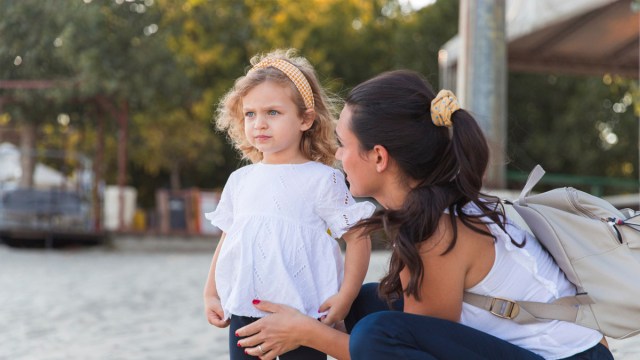It’s inevitable that your toddler will reach a stage when they start saying things about other people’s bodies. Here’s what to tell them
As toddlers grow and become more curious about the world around them, it’s inevitable that they’ll start to ask some questions that might be a little awkward to handle. Some of those revolve around the body types of the people they see out in the world, as one mom noted in a Reddit post where she asked other parents for advice about how to handle this exact issue. And boy did they deliver.
“The other day my 3-year-old points to a youngish woman (with two 8ish yo kids) and says ‘that girl has a big tummy!’ The lady seemed hurt by it and left a couple of minutes later,” the mom wrote in her post. “I’ve been in the scenario several times as a parent and I always just say ‘we don’t talk about people’s bodies’ and then I quickly change the subject.
Is there a better way to handle it? One that might make the person feel better? I mean most people understand but still. I thought that I could respond with something like, ‘yes, isn’t she beautiful?’ But I don’t want to send any subconscious messages to my kids. I feel that it is better psychology to just completely not comment one way or the other on appearances.”
How should you react when your toddler points out someone is fat or other physical trait?
byu/notabot780 inParenting
These are important questions—and relatable ones. All kids will eventually start to notice different body types and likely have questions about them. And as we already know, kids don’t understand the stigmas surrounding things like weight and therefore don’t understand that their questions and comments might seem hurtful or rude.
In the comments, though, other moms had thoughtful responses.
“I tell my kid that we don’t make comments about people’s bodies. She is 5 and old enough to understand that it can hurt feelings. I also let her know that if she has a question she can ask me in private,” one person wrote. “I added the last part because of the most embarrassing situation she has ever put me in. We were in Walgreens and there was a gentleman who was black, wearing an eye patch, and had a prosthetic leg. My daughter very loudly asked me why the black man was dressed up like a pirate. I would have died inside but I could hear the man snickering as he went around the corner.”
Another added, “I think a reminder before you go out in public is a good idea. Just basically a rundown of the expectations at any particular place you go. ‘We’re going shopping today. When we go shopping, we all stay together, we can look at things we like, but we don’t beg for them, and we remember not to comment on anyone else’s body.'”
That’s a great idea—and extremely age-appropriate for toddlers.
One comment came from an early childhood education teacher who shared that she is obese and has freckle patches on her skin. “So I am used to kids’ observations about my body or comparing bodies (and also sometimes I hear about what their parents say, too).”
She wrote, “Kids will ask if I am pregnant, [and] when I say ‘no,’ sometimes they will ask why I have a big belly. I just say that’s how my body is shaped right now and that people come in all shapes and sizes.”
She also noted that despite their tendency to notice differences, kids are very accepting and open-minded. “Kids are remarkably receptive to stuff like this, especially when you are working on grace and courtesy with them. I know it can give parents anxiety, but if you are calm, keep it simple and understandable, they’ll be fine,” she said.
We also love this mom’s scripted response to a child: “‘Wow, it’s great to see you being so observant. People come in all different shapes, sizes, and colors, isn’t that interesting. However, it’s not appropriate to point out these things out loud. If you have any questions, keep them in your mind and you can ask me when we’re in the car/at home.’ It’s a really fine line isn’t it, trying to work out how to explain to a little one that someone might be upset to be called fat without the child then internalizing that it must be because being fat is negative!”
It sure is a fine line, but this advice is sure to help.











